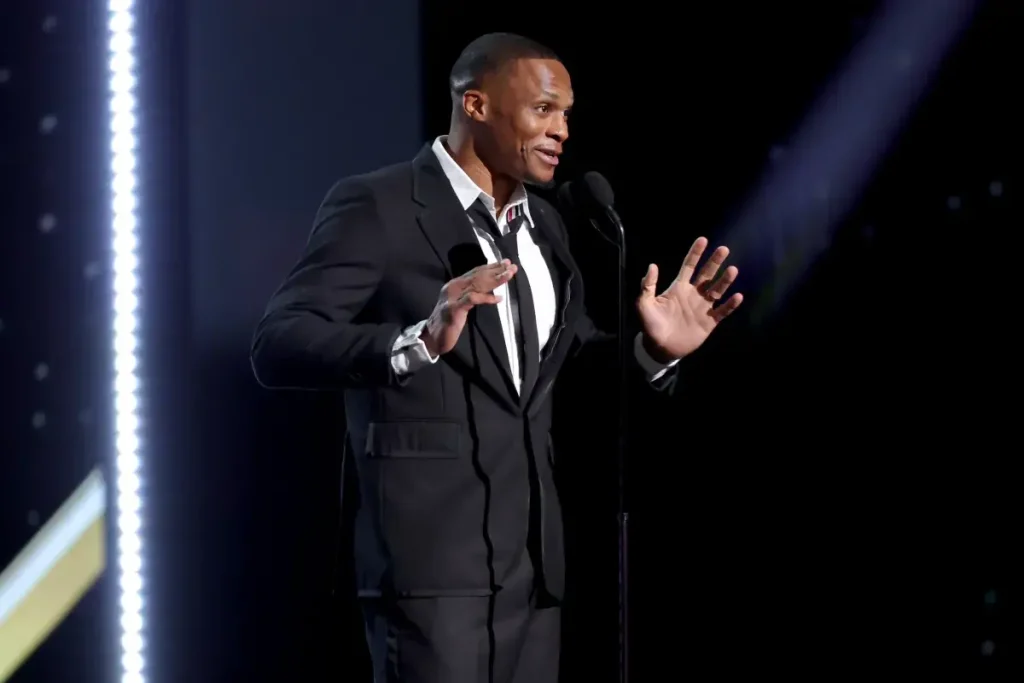Russell Westbrook’s Career Twilight: From MVP to Sacramento King
Russell Westbrook, the dynamic point guard who once dominated NBA headlines as a nine-time All-Star and 2017 MVP, now finds himself in a much different position as he approaches his 18th professional season. At nearly 37 years old, Westbrook recently signed a modest $3.6 million veteran’s minimum deal with the Sacramento Kings after waiting until midway through training camp to find a new team. This represents a significant shift for a player who was once one of the league’s most sought-after stars, commanding maximum contracts and building his legacy as one of the most athletically gifted and statistically productive guards in NBA history.
When asked directly by reporters if he was considering retirement after this season, Westbrook dismissed the notion with a joking “Yeah, right,” suggesting he still sees a future for himself in the league. Despite his age placing him among the 15 oldest active players in the NBA, Westbrook demonstrated last season with the Denver Nuggets that he can still contribute meaningfully in a reserve role. Appearing in 75 games for the 50-32 Nuggets, he posted respectable averages of 13.3 points, 6.1 assists, 4.9 rebounds, and 1.4 steals per game on .449/.323/.661 shooting splits. However, his decision to decline his player option for the 2025-26 season and test free agency ultimately led to a diminished market for his services, culminating in the minimum deal with Sacramento.
The Kings represent an interesting landing spot for the aging star—though perhaps not an ideal one for a player with championship aspirations. Once an exciting, up-and-coming team under former head coach Mike Brown in 2022-23, Sacramento has evolved into what many analysts consider an ill-fitting collection of former All-Stars who struggle defensively. By adding aging veteran guards like Westbrook and 32-year-old Dennis Schröder to a roster already featuring Domantas Sabonis, Zach LaVine, DeMar DeRozan, and Malik Monk, the Kings appear committed to a win-now approach that may have a relatively low ceiling in the hyper-competitive Western Conference.
While Sacramento should have no shortage of offensive firepower with this veteran-laden roster, their prospects in a Western Conference dominated by teams emphasizing youth, defense, and pass-happy offenses remain questionable at best. Westbrook still brings value as a facilitator and scorer—particularly in the first three quarters of games—but his well-documented shortcomings have become more pronounced with age. His jump shot has deteriorated significantly, allowing defenses to sag off him beyond the paint, and his defense has never been his strong suit. Perhaps most critically, he functions best with the ball in his hands, which creates challenges when playing alongside more efficient offensive options at this stage of his career.
Despite these limitations, Westbrook remains one of the great point guards in NBA history, with career achievements few players can match: an MVP award, nine All-Star selections, and becoming the only player besides Oscar Robertson to average a triple-double for an entire season (which Westbrook actually accomplished four times). His explosive athleticism, relentless competitiveness, and statistical dominance defined an era of NBA basketball. Yet the twilight of his career presents a stark contrast to those glory days, as he transitions from franchise cornerstone to veteran bench contributor, from championship contender in Denver to a team fighting for play-in tournament positioning in Sacramento.
The bigger question surrounding Westbrook now becomes when he will recognize it’s time to step away from the game. After a relatively successful season in a reduced role with Denver, he now faces the prospect of “wallowing in total irrelevance” with a Kings team that appears stuck in NBA purgatory. While his competitive drive clearly remains intact—evidenced by his dismissal of retirement questions—the NBA’s musical chairs of free agency has shown that the market for his services continues to narrow. For a player of his stature and accomplishments, the decision of when to walk away on his own terms rather than being forced out by diminishing opportunities may become increasingly relevant as this season progresses. Until then, basketball fans can still appreciate watching one of the most electrifying players of his generation, even if that now happens in a reduced role and on a less prominent stage.


